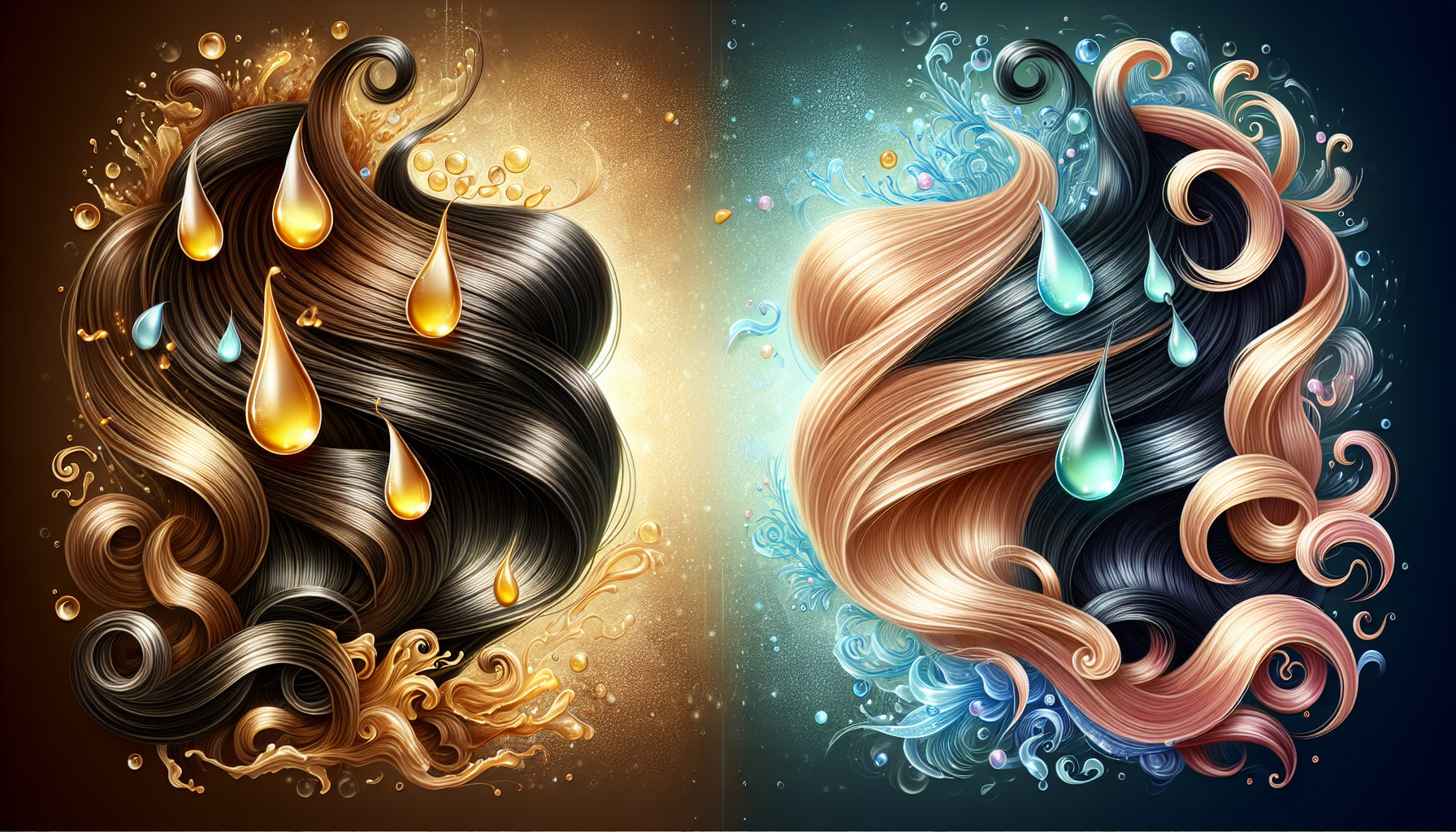Table of Contents
This blog post may contain affiliate links. As an Amazon Associate I earn from qualifying purchases.
Have you ever stood in the hair care aisle, feeling overwhelmed by the choices between hair oil and serum? We’ve all been there, wondering which product will give our locks that perfect shine and health. It’s a common dilemma, and today, we’re going to dive into the hair oil vs serum debate to help you make the best choice for your hair.
In this article, we’ll explore the advantages of hair serum and why many people think it’s good for hair. We’ll also look at the difference between hair serum and hair oil, considering both their benefits and potential drawbacks. We’ll even touch on what people are saying in hair oil vs serum discussions on Reddit. By the end, you’ll have a clear picture of which product might work best for your unique hair needs.
Understanding Hair Oil and Hair Serum
When it comes to hair care, we often find ourselves wondering about the difference between hair oil vs serum. Both products have gained popularity for their ability to improve hair health and appearance, but they serve different purposes and have distinct formulations.
What is Hair Oil?
Hair oil is a cosmetic product designed to nourish and condition the hair. It’s typically made from natural or synthetic oils rich in vitamins, minerals, and fatty acids that provide essential nutrients to the hair and scalp. For generations, hair-oiling has been a secret to achieving shiny, long hair, especially in South Asian cultures.
Hair oils are conditioning treatments that sink into your hair and improve its overall health. They penetrate the hair strands, lubricating them and nourishing them with fatty acids. If you’re looking for a multi-tasker to treat hair prone to breakage, damage, fraying, dryness, frizzing, and split ends, hair oils might be your go-to choice.
What is Hair Serum?
Hair serum, on the other hand, is a versatile hair care product designed to address various hair concerns and improve the overall appearance and manageability of hair. Unlike hair oils, which are often based on natural oils, hair serums typically contain a combination of silicones, amino acids, proteins, and other active ingredients.
Hair serums are known for their lightweight and non-greasy formulas, making them suitable for various hair types, including fine or oily hair. They provide a protective layer over the hair strands, add shine, smoothen the hair, and prevent tangling. Hair serums also offer ample hydration and protection against humidity, making them excellent frizz-fighters.
Key Differences
When comparing hair oil vs hair serum, several key differences stand out:
- Composition: Hair oils are typically natural oils extracted from plants, seeds, or nuts. They’re rich in fatty acids, vitamins, and antioxidants. Hair serums, however, are usually silicone-based and contain synthetic polymers along with additional ingredients like vitamins and antioxidants.
- Consistency: Hair oils tend to be thicker and heavier, while hair serums are lightweight with a smoother, more fluid consistency.
- Purpose: Hair oils are primarily used for deep conditioning, nourishing the scalp, and promoting overall hair health. They’re often applied as pre-shampoo treatments. Hair serums, on the other hand, cater to a range of needs, including frizz control, shine enhancement, heat protection, and detangling.
- Absorption: Hair oils are absorbed into the hair shaft, providing long-lasting moisture and nourishment. They may leave a slightly greasy residue if applied in excess. Hair serums are designed to be quickly absorbed without leaving a heavy or greasy feel.
- Application: Hair oils are often applied in larger amounts and massaged into the scalp and hair. They’re typically left on for a specified period before washing out. Hair serums are applied in smaller amounts, focusing on the mid-lengths and ends of the hair. They can be used on both damp and dry hair, making them convenient for quick styling.
Understanding these differences can help you choose the right product for your hair needs. Whether you opt for hair oil or serum, both can play a valuable role in your hair care routine, helping you achieve healthier, more manageable hair.
Benefits of Hair Oil
Hair oil has made a big comeback in the beauty world, and for good reason. We’ve discovered that it’s not just for moisturizing and softening skin, but it can do wonders for our hair too. Let’s dive into some of the amazing benefits of hair oil.
Nourishment and Moisturization
One of the main advantages of hair oil is its ability to nourish and moisturize our hair. Many oils, like coconut oil, are rich in fatty acids that can penetrate deep into the hair shaft. This helps to replace lost lipids, which are often depleted due to heat styling, chemical treatments, and environmental pollution. By doing this, hair oil can make our hair softer, smoother, and more manageable.
Hair oil can also fill in the spaces between the cuticle cells of our hair strands. This helps to protect the hair follicles and can lead to stronger, healthier hair over time. Some oils, like avocado oil, are especially good at this because they can actually penetrate the hair shaft rather than just coating it.
Another great thing about hair oil is that it can help protect our hair from daily wear and tear. It does this by reducing swelling and drying of the hair, which is known as hygral fatigue. This is really the secret power behind hair oil – it’s not just moisturizing, but it can even protect our hair from the elements.
Scalp Health
A healthy scalp is crucial for healthy hair, and hair oil can play a big role in maintaining scalp health. Oils are perfect for the scalp because, unlike heavy creams and balms, they won’t clog the scalp’s sebaceous glands as easily. Instead, they absorb evenly into the scalp to deliver their fatty acids and lipids, which moisturize and nourish the scalp.
Some oils, like coconut oil, have been found to have a positive effect on the scalp. A study from 2021 showed that coconut oil can help improve scalp health. Other oils, like black cumin seed oil, are known for their antibacterial, anti-fungal, and anti-inflammatory properties, which can be great for scalp health.
It’s worth noting that while hair oiling can be beneficial for some, it’s not for everyone. People with fine, straight hair might find that oiling weighs their hair down too much. On the other hand, those with dry, coarse, or tightly curled hair often see more benefits from hair oiling.
Hair Growth
While more research is needed, some studies suggest that certain hair oils might help with hair growth. For example, rosemary oil has shown promising results in promoting hair growth. One study found that rosemary oil was just as effective in increasing hair count as minoxidil, a common hair growth treatment.
Other oils, like castor oil, are believed to promote hair growth due to their unique properties. Castor oil contains ricinoleic acid, which is thought to improve blood circulation to the scalp. This increased blood flow could potentially stimulate hair growth.
It’s important to remember that while hair oils can offer many benefits, they’re not a magic solution. The best results come from consistent use as part of a broader hair care routine. Whether you’re looking to boost moisture, improve scalp health, or potentially promote growth, there’s likely a hair oil out there that can help you achieve your hair goals.
Benefits of Hair Serum
Hair serum has become a popular choice for many people looking to improve their hair’s appearance and health. Let’s dive into some of the key benefits that make hair serum a go-to product for many.
Frizz Control
One of the main advantages of hair serum is its ability to tame frizz and flyaways. Many hair serums are specifically formulated to combat frizz, helping to create a smoother, more polished look. For example, some products claim to “say goodbye to frizz and hello to flawless, radiant hair”. The frizz-fighting properties of hair serum can be especially beneficial for those with dry or damaged hair, as it helps to smooth the hair shaft and reduce the appearance of frizz.
Hair serums often contain ingredients like silicones, which create a protective barrier around the hair strands. This barrier helps to lock in moisture and prevent humidity from penetrating the hair shaft, which is a common cause of frizz. Some serums also include natural oils like argan or coconut oil, which can further help to smooth and nourish the hair.
Heat Protection
Another significant benefit of hair serum is its ability to protect hair from heat damage. Many hair serums are designed to act as a heat protectant, shielding your hair from the high temperatures of styling tools like flat irons and blow dryers. Some serums can protect hair from heat damage up to 446°F.
Heat protection is crucial for maintaining healthy hair, especially if you frequently use heat styling tools. The protective ingredients in hair serums form a barrier between your hair and the heat source, helping to minimize damage and keep your hair looking healthy and shiny.
It’s worth noting that while many hair serums offer heat protection, not all of them are specifically formulated for this purpose. If heat protection is a priority for you, look for serums that explicitly mention heat protection on their packaging or in their product descriptions.
Shine Enhancement
Hair serum is also known for its ability to enhance the natural shine of your hair. Many serums are formulated to add a glossy finish to your locks, making them look healthier and more vibrant. Some products claim to offer “fabulous sensory properties” and leave hair looking shiny.
The shine-enhancing properties of hair serum come from ingredients like natural oils and silicones. These ingredients coat the hair shaft, smoothing down the cuticle and reflecting light more effectively. This results in hair that looks shinier and feels smoother to the touch.
In addition to these key benefits, hair serums often offer other advantages. Many serums provide deep conditioning and moisturization, helping to combat dryness and improve overall hair health. Some even offer UV protection, shielding your hair from sun damage.
It’s important to note that while hair serums offer many benefits, they may not be suitable for everyone. People with very fine or oily hair might find that some serums weigh their hair down or make it look greasy. It’s always a good idea to choose a serum that’s appropriate for your hair type and to use it sparingly, especially if you’re new to using hair serums.
In conclusion, hair serum can be a valuable addition to your hair care routine, offering benefits like frizz control, heat protection, and shine enhancement. When choosing between hair oil vs serum, consider your specific hair needs and the results you’re looking to achieve. With the right product and application technique, hair serum can help you achieve smoother, shinier, and healthier-looking hair.
Which Should You Use?
The choice between hair oil and serum ultimately depends on your individual hair needs and preferences. Both products offer unique benefits, and understanding their differences can help you make an informed decision.
Hair oil is ideal for those seeking deep conditioning, scalp nourishment, and long-lasting moisture. It’s particularly beneficial for dry, damaged, or coarse hair.
Hair serum is a versatile product that excels at frizz control, heat protection, and shine enhancement. It’s suitable for various hair types, including fine or oily hair.
Ultimately, the best way to determine which product is right for you is to experiment and see what works best for your hair. Consider factors such as your hair type, styling habits, and desired outcomes. By understanding the benefits of both hair oil and serum, you can make a confident choice and achieve healthier, more beautiful hair.


